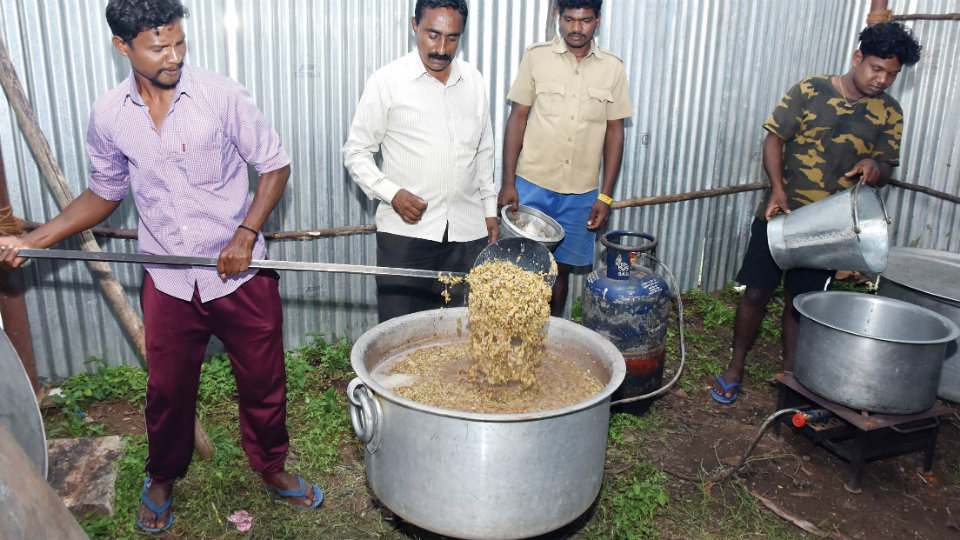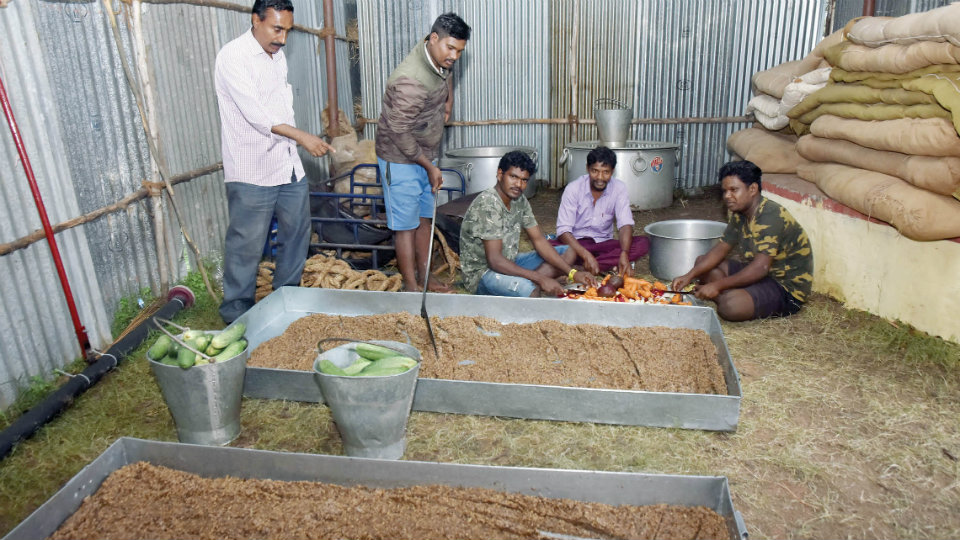Mysuru: Elephants are herbivorous and will almost eat anything vegetarian ranging from leaves, barks, twigs, shrubs and bushes, fruits, roots and flowers. As large animals it is understandable that they need large quantities of food. Elephants use their muscular trunks, a very versatile appendage, for digging roots and uprooting plants, plucking leaves and breaking branches off the trees.
Sixteen to eighteen hours, or nearly 80 percent of an elephant’s day is spent in feeding. They eat roughly 10 percent of their bodyweight in food every day. So, about 360 kg of food is required daily for an elephant weighing 3,500 kg. So if Howdah elephant Arjuna, housed now in Mysore Palace along with other elephants, is weighing 5,500 kg, he needs 550 kgs of food every day.
For strength and stamina
Apart from the regular green leaves, water and fruits, a special diet along with fitness regime is being administered to the elephants every day. The elephants are being given nutritional food twice a day so that they could gain weight, strength and stamina to participate in the Jumboo Savari by walking a distance of about 4 kms from the Mysore Palace to the Torchlight Parade Grounds in Bannimantap.
Every year, these elephants reach Mysuru 60 days before the festival from their camps. But this year, the elephants have arrived just when the festival is round the corner. Now, the onus is on the Forest Department to train these elephants.
No force-feeding
Officers in-charge say that this year they have decided to feed them a more ‘nutritious recipe’ to make them fit and feel better. But at the same time, care is being taken not to force-feed the pachyderms as they will take ill due to excessive feeding. They are fed according to their weight and digestive capabilities.
One of the reasons why they have to consume so much food daily is due to their huge bodies. They only process about 40 percent of what they eat as the rest of it never gets digested. The digestion process of elephants is different than that of other animals. It is not really understood why their bodies don’t digest more of what they consume. They need to consume lots of water.

Strict monitoring
The food regime is compact and is monitored from the start to end — from the process of selecting grains, preparation of food, feeding them and examination of elephant poop. Elephant dung also tells experts about their health. Twice a day, Forest Department Assistant Rangaraju, famous as ‘nail man’, tests poop (dung) of elephants to testify the health condition of the pachyderm.
“Elephant dung tells us a lot about its health. We can see if the food is digested well or if there are any worms or insects in its stomach or if the elephant is suffering from a stomach ailment. Dung of all Dasara elephants are examined closely both in the morning and evening. Medicines are fed accordingly,” Rangaraju says.
Rich recipes, special diet
A separate shed has been constructed to cook food for these elephants near Sri Kodi Someshwara Temple in the Palace premises and food is being prepared in large vessels. Food preparation starts from 5.30 am where first urad dal and wheat are cooked to which green gram, parboiled rice and onions are added and boiled for about two-and-a-half-hours and left to cool down for about an hour.
This recipe is mixed and made into big balls and mixed with roughly shredded vegetables including beetroot, carrot, radish, knol khol and cucumber and given to elephants twice a day. The time, duration and quantity are decided by Veterinarians depending on age and gender of the elephants. Each of these animals are given 3 kg of this recipe and gradually increased up to 25 to 30 kg per session.
Rangaraju has been given the responsibility of preparing these nutritious recipes rich in protein, carbohydrates, fat and multitude of other nutrients. Minerals and vitamins supplements are being added to these recipes to overcome any shortcomings from these natural grains, pulses and vegetables.
Vegetables add to taste
Every day, about 70 kg each of green gram, urad dal, parboiled rice and wheat are cooked which is topped up with 70 kg each of beetroot, carrot, radish, knol khol and cucumber. The aim is to give about 15 to 25 kg of nutritious food to all elephants. Only Arjuna is given 25 to 30 kg of nutritious food per meal.
Male elephants are being be supplemented with half kilogram to one kilogram of butter while Arjuna is given one-and-a-half kilogram of butter every day. Other than this nutritious recipe, each of them are being provided natural favourite greens including 450 to 600 kg of banyan leaves, 250 kg of green grass and 50 kg of paddy straw.
In addition to this, about 35 kg ‘kusure’ comprising jaggery, paddy, groundnut cake and salt sandwiched between paddy straw is also given. These elephants usually consume about 250 to 300 litres of water daily. Special and utmost care is being taken while cooking food for these Dasara guests as a small mistake would create a lot of problems to the jumbos.








Recent Comments